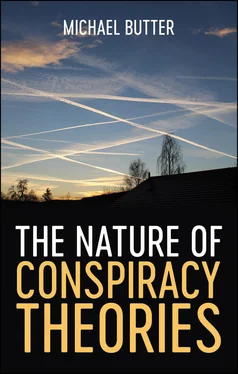1 Title page The Nature of Conspiracy Theories Michael Butter Translated by Sharon Howe polity
2 Copyright page
3 Acknowledgements
4 Introduction, or: What’s the plan? Notes
5 1 ‘Everything is planned’, or: What is a conspiracy theory? Characteristics Typologies Conspiracy theories and real conspiracies The term as a means of delegitimization Conspiracy theories as theories Notes
6 2 ‘Nothing is as it seems’, or: How do conspiracy theorists argue? Structure and strategies of argumentation Evidence Countering the official version Case study: Daniele Ganser Metaphors and more Notes
7 3 ‘Everything is connected’, or: Why do people believe in conspiracy theories? Functions Are conspiracy theories for losers? Propaganda and commerce Case study: Alex Jones Notes
8 4 The story so far, or: How have conspiracy theories evolved historically? Emergence and development up to the twentieth century Delegitimization and stigmatization after 1945 Case study: the myth of the global Jewish conspiracy Conspiracy theories and populism Notes
9 5 Current trends, or: How is the internet changing conspiracy theories? The ‘truth’ is just a Google search away Relegitimization in the echo chamber From conspiracy theories to conspiracy rumours Case study: Donald Trump Notes
10 Conclusion: When are conspiracy theories dangerous and what can we do about them? Notes
11 Index
12 End User License Agreement
1 Cover
2 Contents
3 1 ‘Everything is planned’, or: What is a conspiracy theory?
1 iii
2 iv
3 vi
4 1
5 2
6 3
7 4
8 5
9 6
10 7
11 8
12 164
13 165
14 9
15 10
16 11
17 12
18 13
19 14
20 15
21 16
22 17
23 18
24 19
25 20
26 21
27 22
28 23
29 24
30 25
31 26
32 27
33 28
34 29
35 30
36 31
37 166
38 167
39 168
40 32
41 33
42 34
43 35
44 36
45 37
46 38
47 39
48 40
49 41
50 42
51 43
52 44
53 45
54 46
55 47
56 48
57 49
58 50
59 51
60 52
61 53
62 54
63 55
64 56
65 57
66 58
67 59
68 60
69 61
70 62
71 63
72 169
73 170
74 171
75 172
76 64
77 65
78 66
79 67
80 68
81 69
82 70
83 71
84 72
85 73
86 74
87 75
88 76
89 77
90 78
91 79
92 80
93 81
94 82
95 83
96 84
97 85
98 86
99 87
100 88
101 89
102 90
103 173
104 174
105 175
106 176
107 91
108 92
109 93
110 94
111 95
112 96
113 97
114 98
115 99
116 100
117 101
118 102
119 103
120 104
121 105
122 106
123 107
124 108
125 109
126 110
127 111
128 112
129 113
130 114
131 115
132 116
133 117
134 118
135 119
136 120
137 177
138 178
139 179
140 180
141 181
142 182
143 121
144 122
145 123
146 124
147 125
148 126
149 127
150 128
151 129
152 130
153 131
154 132
155 133
156 134
157 135
158 136
159 137
160 138
161 139
162 140
163 141
164 142
165 143
166 144
167 145
168 146
169 147
170 148
171 149
172 150
173 183
174 184
175 185
176 186
177 151
178 152
179 153
180 154
181 155
182 156
183 157
184 158
185 159
186 160
187 161
188 162
189 163
190 187
191 189
192 190
193 191
194 192
195 193
196 194
197 195
198 196
199 197
200 198
201 199
202 200
203 201
204 202
The Nature of Conspiracy Theories
Michael Butter
Translated by Sharon Howe
polity
Originally published in German as ‘ Nichts ist, wie es scheint’: Über Verschwörungstheorien © Suhrkamp Verlag Berlin 2018. All rights reserved by and controlled through Suhrkamp Verlag Berlin
This English edition © 2020 by Polity Press
Polity Press
65 Bridge Street
Cambridge CB2 1UR, UK
Polity Press
101 Station Landing
Suite 300
Medford, MA 02155, USA
All rights reserved. Except for the quotation of short passages for the purpose of criticism and review, no part of this publication may be reproduced, stored in a retrieval system or transmitted, in any form or by any means, electronic, mechanical, photocopying, recording or otherwise, without the prior permission of the publisher.
ISBN-13: 978-1-5095-4081-5
ISBN-13: 978-1-5095-4082-2 (paperback)
A catalogue record for this book is available from the British Library.
Library of Congress Cataloging-in-Publication Data
Names: Butter, Michael, author.
Title: The nature of conspiracy theories / Michael Butter ; translated by Sharon Howe.
Other titles: “Nichts ist, wie es scheint”. English
Description: Cambridge, UK ; Medford, MA : Polity Press, 2020. | Includes bibliographical references and index. | Summary: “A comprehensive introduction to conspiracy theories and their growing presence in the age of the internet”-- Provided by publisher.
Identifiers: LCCN 2020008369 (print) | LCCN 2020008370 (ebook) | ISBN 9781509540815 (hardback) | ISBN 9781509540822 (paperback) | ISBN 9781509540839 (epub)
Subjects: LCSH: Conspiracy theories. | History--Errors, inventions, etc.
Classification: LCC HV6275 .B8813 2020 (print) | LCC HV6275 (ebook) | DDC 001.9--dc23
LC record available at https://lccn.loc.gov/2020008369
LC ebook record available at https://lccn.loc.gov/2020008370
Typeset in 10.5 on 12pt Sabon
by Fakenham Prepress Solutions, Fakenham, Norfolk NR21 8NL
Printed and bound in Great Britain by TJ International Limited
The publisher has used its best endeavours to ensure that the URLs for external websites referred to in this book are correct and active at the time of going to press. However, the publisher has no responsibility for the websites and can make no guarantee that a site will remain live or that the content is or will remain appropriate.
Every effort has been made to trace all copyright holders, but if any have been overlooked the publisher will be pleased to include any necessary credits in any subsequent reprint or edition.
For further information on Polity, visit our website: politybooks.com
It is a great pleasure to thank the many people who ‘conspired’ with me on this project in manifold ways over the past years. Daniel Graf planted the idea for this book in my mind many years ago and finally made me pursue it. Elise Heslinga and John Thompson at Polity were a pleasure to work with. So were Heinrich Geiselberger and Nora Mercurio at Suhrkamp, which published the original German version in 2018. Special thanks are due to Sharon Howe for not getting lost in my overly long German sentences while translating the book. That I felt that I had something to say at all is mostly due to the impact of a number of wonderful colleagues who shared their ideas with me over the years. I am thinking in particular of the members of the COST Action ‘Comparative Analysis of Conspiracy Theories’, many of whom have become good friends over the past years. I am especially indebted to Peter Knight, Andrew McKenzie-McHarg and Claus Oberhauser. I would also like to acknowledge the impact that Andreas Anton has had on my thoughts about conspiracy theories. I mention him only in one endnote (and completely forgot to mention him in the German edition), but his take on conspiracy theories as a form of knowledge had a lasting effect on me. Finally, I would like to thank my research assistants Alexandra Dempe and Hannah Herrera for tracking down references, formatting endnotes and bearing with me when I decided to change something once again.
Читать дальше












